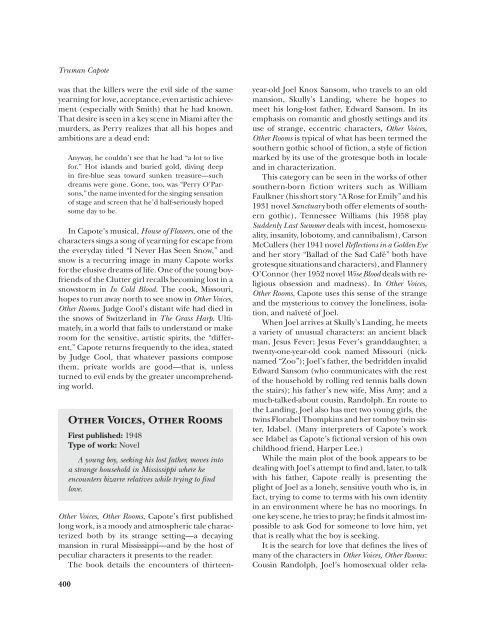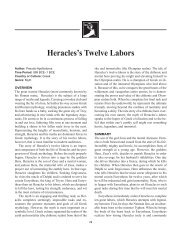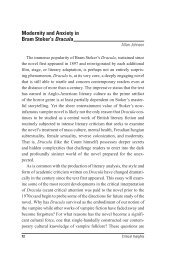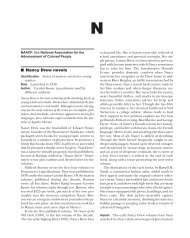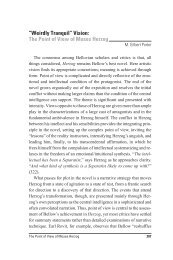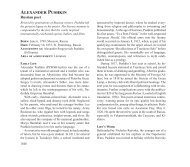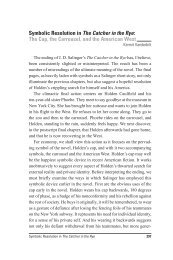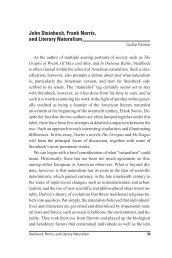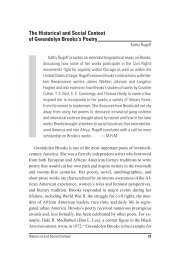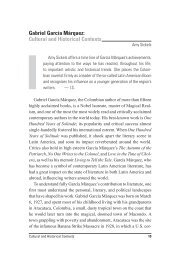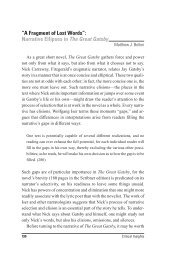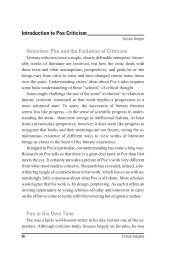Truman Capote - Salem Press
Truman Capote - Salem Press
Truman Capote - Salem Press
Create successful ePaper yourself
Turn your PDF publications into a flip-book with our unique Google optimized e-Paper software.
<strong>Truman</strong> <strong>Capote</strong><br />
was that the killers were the evil side of the same<br />
yearning for love, acceptance, even artistic achievement<br />
(especially with Smith) that he had known.<br />
That desire is seen in a key scene in Miami after the<br />
murders, as Perry realizes that all his hopes and<br />
ambitions are a dead end:<br />
Anyway, he couldn’t see that he had “a lot to live<br />
for.” Hot islands and buried gold, diving deep<br />
in fire-blue seas toward sunken treasure—such<br />
dreams were gone. Gone, too, was “Perry O’Parsons,”<br />
the name invented for the singing sensation<br />
of stage and screen that he’d half-seriously hoped<br />
some day to be.<br />
In <strong>Capote</strong>’s musical, House of Flowers, one of the<br />
characters sings a song of yearning for escape from<br />
the everyday titled “I Never Has Seen Snow,” and<br />
snow is a recurring image in many <strong>Capote</strong> works<br />
for the elusive dreams of life. One of the young boyfriends<br />
of the Clutter girl recalls becoming lost in a<br />
snowstorm in In Cold Blood. The cook, Missouri,<br />
hopes to run away north to see snow in Other Voices,<br />
Other Rooms. Judge Cool’s distant wife had died in<br />
the snows of Switzerland in The Grass Harp. Ultimately,<br />
in a world that fails to understand or make<br />
room for the sensitive, artistic spirits, the “different,”<br />
<strong>Capote</strong> returns frequently to the idea, stated<br />
by Judge Cool, that whatever passions compose<br />
them, private worlds are good—that is, unless<br />
turned to evil ends by the greater uncomprehending<br />
world.<br />
Other Voices, Other Rooms<br />
First published: 1948<br />
Type of work: Novel<br />
A young boy, seeking his lost father, moves into<br />
a strange household in Mississippi where he<br />
encounters bizarre relatives while trying to find<br />
love.<br />
Other Voices, Other Rooms, <strong>Capote</strong>’s first published<br />
long work, is a moody and atmospheric tale characterized<br />
both by its strange setting—a decaying<br />
mansion in rural Mississippi—and by the host of<br />
peculiar characters it presents to the reader.<br />
The book details the encounters of thirteen-<br />
400<br />
year-old Joel Knox Sansom, who travels to an old<br />
mansion, Skully’s Landing, where he hopes to<br />
meet his long-lost father, Edward Sansom. In its<br />
emphasis on romantic and ghostly settings and its<br />
use of strange, eccentric characters, Other Voices,<br />
Other Rooms is typical of what has been termed the<br />
southern gothic school of fiction, a style of fiction<br />
marked by its use of the grotesque both in locale<br />
and in characterization.<br />
This category can be seen in the works of other<br />
southern-born fiction writers such as William<br />
Faulkner (his short story “A Rose for Emily” and his<br />
1931 novel Sanctuary both offer elements of southern<br />
gothic), Tennessee Williams (his 1958 play<br />
Suddenly Last Summer deals with incest, homosexuality,<br />
insanity, lobotomy, and cannibalism), Carson<br />
McCullers (her 1941 novel Reflections in a Golden Eye<br />
and her story “Ballad of the Sad Café” both have<br />
grotesque situations and characters), and Flannery<br />
O’Connor (her 1952 novel Wise Blood deals with religious<br />
obsession and madness). In Other Voices,<br />
Other Rooms, <strong>Capote</strong> uses this sense of the strange<br />
and the mysterious to convey the loneliness, isolation,<br />
and naïveté of Joel.<br />
When Joel arrives at Skully’s Landing, he meets<br />
a variety of unusual characters: an ancient black<br />
man, Jesus Fever; Jesus Fever’s granddaughter, a<br />
twenty-one-year-old cook named Missouri (nicknamed<br />
“Zoo”); Joel’s father, the bedridden invalid<br />
Edward Sansom (who communicates with the rest<br />
of the household by rolling red tennis balls down<br />
the stairs); his father’s new wife, Miss Amy; and a<br />
much-talked-about cousin, Randolph. En route to<br />
the Landing, Joel also has met two young girls, the<br />
twins Florabel Thompkins and her tomboy twin sister,<br />
Idabel. (Many interpreters of <strong>Capote</strong>’s work<br />
see Idabel as <strong>Capote</strong>’s fictional version of his own<br />
childhood friend, Harper Lee.)<br />
While the main plot of the book appears to be<br />
dealing with Joel’s attempt to find and, later, to talk<br />
with his father, <strong>Capote</strong> really is presenting the<br />
plight of Joel as a lonely, sensitive youth who is, in<br />
fact, trying to come to terms with his own identity<br />
in an environment where he has no moorings. In<br />
one key scene, he tries to pray; he finds it almost impossible<br />
to ask God for someone to love him, yet<br />
that is really what the boy is seeking.<br />
It is the search for love that defines the lives of<br />
many of the characters in Other Voices, Other Rooms:<br />
Cousin Randolph, Joel’s homosexual older rela-


